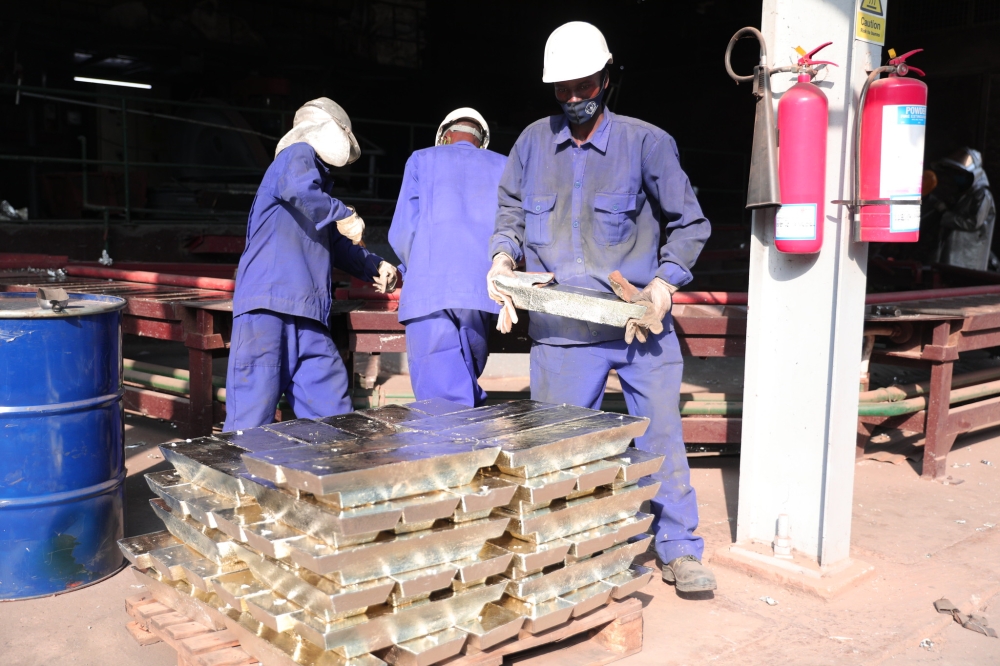

Gold and other mineral investors venturing into processing could pay lower tax rates if proposed changes by the government in a new draft law are approved by parliament. The move intends to promote value addition for higher revenues and discourage the exportation of unprocessed minerals, according to the bill.
The proposals are contained in a new draft law establishing a tax on minerals whose relevance was approved by the Lower House on April 17.
It will be scrutinised by the responsible parliamentary committee prior to being voted into law by a plenary sitting of the Lower House.
Identified loopholes
According to an explanatory note of the new bill, the current law of 2013 on mineral taxes presents loopholes, including inefficiency in promoting value addition of minerals as both exporters of processed and unprocessed minerals pay the same tax rates, which adversely affects the mineral smelters and refineries.
ALSO READ: PHOTOS: Rwanda gets first gold refinery
Also, the existing legislation includes a single tax point (on export), it pointed out. This leads to taxing minerals sourced outside [for re-export purposes], which undermines positioning Rwanda as a mineral processing hub, it added.
Another issue is that certain tax rates are excessively high, the government observed, indicating that six per cent imposed on the norm value of gold is considered punitive.
Again, there is a case of unfair treatment whereby, during the determination of the tax base, the current law only considers the gross market value and ignores the mineral treatment charges incurred by the exporter.
An issue of the limited tax base in the current law was also raised in the bill, which indicates that it applies to base metals, precious metals of the gold category, and precious stones of the diamond category, leaving out other categories of minerals.
Key proposed tax changes to the current law
Article 4 of the new bill (proposed) sets low rates of mining royalty tax applicable to minerals supplied to the local mineral processing facilities to encourage value addition.
The tax rates are three per cent of the norm value for base metals; two per cent of the gross value for gemstones (used in jewellery); and two per cent of the norm value for platinum group metals.
Others are rare earth elements (high-tech metals such as uranium) that could attract a two per cent tax rate of the norm value, energy minerals (such as lithium and cobalt) with three per cent of the norm value; and the category of gold with 0.5 per cent of the norm value – which is the lowest proposed rate of all.
ALSO READ: RDB unveils mineral reserves seeking investors for value addition
Meanwhile, article 5 of the bill (proposed) sets additional tax rates applicable to exported raw minerals to discourage such a practice.
The rates are two per cent of the norm value for base metals; three per cent of the gross value for gemstones; two per cent of the norm value for platinum group metals, one per cent of the norm value for rare earth elements, two per cent of the norm value for energy minerals; and 0.5 per cent of the norm value for the category of gold.
Why the proposed amendments?
In an explanatory note of the bill, the government indicated that according to the National Strategy for Transformation (NST1), the mining sector is entrusted with the mandate to respond to the national objective of increased value addition for minerals and quarry products by attracting investment in mineral processing and value addition.
While the mining sector is expected to attract more investments in mineral value addition and playing a role in generating jobs through mineral value addition and processing, it pointed out, the existing law presents certain shortcomings in terms of promoting added value, thus slowing down the pace towards achieving the objectives of the NST1, which potentially hinders desired economic growth and national development.
"The review of the law currently in force aims to ensure that Rwanda benefits from its mineral resources by addressing legal challenges and gaps identified over the past ten years,” the explanatory note reads in part.
Rwanda’s mineral export revenue rose to more than $1.1 billion (approx. Rwf1.4 trillion) in 2023, up from the $772 million recorded in 2022, representing an increase of 43 per cent, while the target is to generate $1.5 billion by the end of 2024, according to Rwanda Mines, Petroleum and Gas Board.


